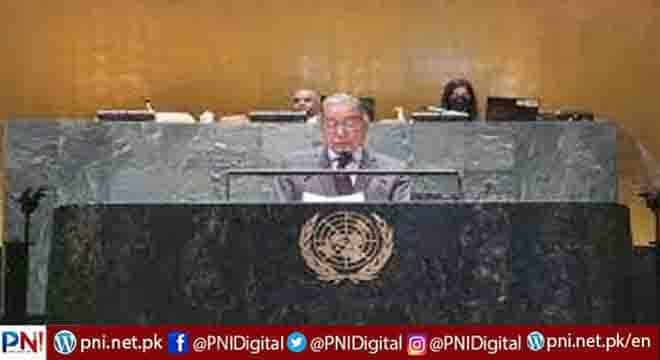UNITED NATIONS, Mar 16 (APP): The unanimous adoption of Tuesday’s landmark resolution by the UN General Assembly proclaiming March 15 as International Day to Combat Islamophobia has set the stage for Pakistan to work, along with OIC partners and the world community, on developing joint strategies aimed at countering the threat posed by the abhorrent phenomenon, according to diplomatic sources.
The resolution comes at a time when Islamophobia is rampant, especially since the 9/11 terrorist attacks against the United States when some countries began equating Islam with terrorism, a trend that also witnessed proliferation of hate speech against Muslims.
It’s adoption by the 193-member Assembly marked the culmination of years of efforts by a group of OIC countries — Pakistan, Turkey, Saudi Arabia, Jordan, Iran, Niger and Indonesia — that led to securing the agreement of the Western world in actively combating the growing Islamophobia.
“We are gratified by the active cooperation among Islamic countries which has made it possible to secure the world community’s recognition of the need to combat Islamophobia,” Ambassador Munir Akram, Pakistan’s permanent representative to the UN, who introduced the resolution in the General Assembly, said in an interview with APP correspondent.
The consensus resolution, he said, is “an important milestone in the dedicated endeavour launched by Prime Minister Imran Khan to mobilize an international campaign to counter the endemic prejudice, discrimination, hate and violence against Islam and Muslims in various parts of the world.”
Indeed, Prime Minister Khan was the first to raise the issue of Islamophobia at the U.N. in his maiden 2019 address to the General Assembly, and has repeatedly called for international attention and efforts to address it.
In this regard, according to the sources, Pakistan, in cooperation with the Islamic world and the international community, will take several actions to combat Islamophobia whose manifestations are hate speech, discrimination, and violence against Muslims.
It was pointed out that the 47th session of the OIC Council of Foreign Ministers, held in Niamey, Niger, in November 2020, unanimously adopted a resolution initiated by Pakistan for the designation of 15 March as the International Day to Combat Islamophobia.
Following up, the first task was to convince the Islamic countries to move a resolution in the UN General Assembly as some of them were of the view that Western countries will not support it.
Having mobilized their support, the OIC group was formed and it began extensive consultations with the western countries on the text of the draft resolution for UN General Assembly.
In the course of intensive consultations, most countries agreed with the text that was developed, including Russia and China, but India played a negative role in the process.
India’s role became evident as its Ambassador T. S. Tirumurti expressed concern in the General Assembly on Tuesday over phobia against one religion — Islam — being elevated to the level of an international day.
“It is important that the United Nations remains above such religious matters which may seek to divide us rather than bring us together on one platform of peace and harmony and treat the World as One Family,” he said.
Ambassador Akram, the Pakistani envoy, countered that argument, saying “The objective of observing this Day is about uniting, not dividing.”
During the negotiation on the draft for the Assembly, the main objection was singling out Islamophobia as some Western countries argued that discrimination exits against all religions. Pakistan and other members of the group countered their arguments by saying that precedents exist as the General Assembly had proclaimed International Holocaust Remembrance Day, which concerned only one religion, as also the International Day of Vesak relating to Buddhism. Those counties were also told that Islamophobia was a reality and UN should recognize and agree to measure to fight this phenomenon.
India, according to the sources, insisted on inserting in the text a reference to ‘Hindu phobia’, but found no support during the negotiations. In fact, India was the only country which threatened to call for a vote, but having been isolated, it was obliged to go along with the consensus adoption of the resolution.
In a message released in Islamabad, Foreign Minister Shah Mahmood Qureshi said the adoption of this resolution came at a time when hate speech, discrimination and violence against Muslims were proliferating in several parts of the world including in our neighbourhood.
“It is on vivid display in the Indian Illegally Occupied Jammu and Kashmir (IIOJK). Islamophobia today is manifested in negative profiling by security agencies, stigmatization, deliberate vandalizing of Islamic symbols and holy sites, killings by cow vigilantes, discriminatory laws and policies, ban on hijab, attacks on mosques, pronouncements by far-right parties that call for expulsion and even “genocide” of Muslims, anti-Muslim migrant bias, and attacks on the dignity of Muslim women,” he commented.
FM Qureshi also said in his message that the commemoration of an International Day to Combat Islamophobia would raise international awareness about increasing Islamophobia and anti-Muslim hatred besides promoting a message of tolerance, peaceful co-existence and interfaith and cultural harmony.
Follow the PNI Facebook page for the latest news and updates.








